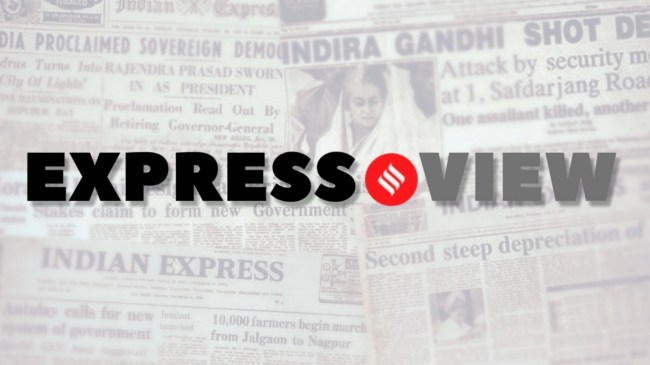Opinion Express View on Maharashtra Special Public Security Bill: Call it back
It will aid state overreach, criminalise dissent. Fadnavis government must step back
 The Bill provides for a jail term of up to seven years for “any action” that is “spoken or written” or “by visual representation” that can be construed as a “danger to peace and tranquillity” or interferes with “maintenance of public order”, and it allows for attaching the property of an accused.
The Bill provides for a jail term of up to seven years for “any action” that is “spoken or written” or “by visual representation” that can be construed as a “danger to peace and tranquillity” or interferes with “maintenance of public order”, and it allows for attaching the property of an accused. There are salient differences between Left Wing Extremism (LWE) — which has been flagged by successive governments at the Centre and in the states as a grave internal security threat — and “urban Maoism”. The former, an insurgency against the state, has targeted security forces, government officials, civilians and politicians and invited a whole-of-government response that includes armed engagement, development work and a host of other policies and actions. The latter is a political term of relatively recent vintage that has been deployed controversially against activists, students and academics who have expressed dissent with the dominant ideology or political establishment. Disturbingly, the Maharashtra Special Public Security Bill, passed by the lower House, conflates the two. Its loosely defined scope and stringent provisions raise spectres of state overreach and misuse. Armed with vague and opaque definitions, it invites the danger of blurring the lines between extremist violence and non-violent dissent.
The Bill fails the test established by the Supreme Court as far back as 1962 in Kedar Nath Singh vs State of Bihar. Words and ideas, no matter how critical of the government, even the state itself, do not constitute sedition or a crime unless they can be directly linked to an incitement to violence. The Bill provides for a jail term of up to seven years for “any action” that is “spoken or written” or “by visual representation” that can be construed as a “danger to peace and tranquillity” or interferes with “maintenance of public order”, and it allows for attaching the property of an accused. In this respect, it is more stringent than the most controversial sections of the Prevention of Money Laundering Act. Democracy, in practice, is the right to speak and write, to draw and debate, to disagree and criticise. The Constitution recognises this in its guarantees of the fundamental rights to speech and expression. The Special Public Security Act violates that promise in letter and spirit.
Chief Minister Devendra Fadnavis, who tabled the Bill, said that it was needed to counter organisations that are “brainwashing the youth”. He should have more faith in the maturity of the young. He spoke of how LWE influence is waning in the state, as in much of the “red corridor”, which, he said, is down from four districts to two blocks. Why, then, raise the bogey of “urban Maoism”? It is difficult not to see the Bill as an attempt to arrogate more powers to the state and to help it to criminalise political-ideological opponents. The Maharashtra government must rethink the law.





